Want to help your toddler talk more and grow their vocabulary? This is key for their communication skills. As a parent, you’re a big help in this area. Creating a supportive space for language growth is vital.
On this journey, you’ll learn what to expect and how to spot signs of good language skills. You’ll discover ways to encourage your toddler’s speech and vocabulary. With these tips, you’ll support your child’s language growth and prepare them for a lifetime of communication.
Key Takeaways
- Encouraging your toddler to speak is key for their language and future communication.
- A supportive environment is vital for their speech development.
- Knowing the signs of healthy language can help spot issues early.
- Building vocabulary is a big part of their communication skills.
- By using these tips, you can help your child’s speech development and set them up for success.
- Early language skills have a lasting impact on their future communication.
Understanding Your Toddler’s Speech Development Journey
As a parent, knowing how important toddler language development is for your child’s growth is key. Understanding speech milestones helps spot issues early and support your child’s language growth. Promoting speech in young children needs patience, dedication, and the right strategies.
To help your toddler talk, create a supportive environment. Talk, read, and sing together. This supports their toddler language development and builds strong communication skills for the future.
Key Milestones in Speech Development
- Babbling and cooing (6-9 months)
- Saying first words (9-12 months)
- Combining two words (12-18 months)
- Forming simple sentences (18-24 months)
What to Expect at Different Ages
As your child grows, their language skills will change. Keep an eye on their progress and offer help when needed. By staying informed and involved, you can better support your child’s speech development and help them overcome any challenges.
Creating a Language-Rich Environment at Home
To help toddlers learn language, it’s key to make their home a supportive place. You can do this by adding activities that help with speech development into your daily life. For example, reading books with simple, colorful pictures can boost their vocabulary and understanding.
Here are some ways to make your home a language-rich space:
- Have conversations with your toddler all day, even about simple things
- Sing songs and recite nursery rhymes to help with sound awareness
- Label objects and actions to teach new words
By making these activities a regular part of your day, you give your toddler a strong base for language. Encouraging language in toddlers needs patience, consistency, and creativity. Try creating a “talking” routine, like talking during meals, bath time, or bedtime.
Every time you talk to your toddler, you’re helping them learn to communicate. Pay attention to the language you use and the activities you do together. With regular effort, you can make a home environment that supports your toddler’s speech growth and prepares them for the future.
| Activity | Benefits |
|---|---|
| Reading books | Develops vocabulary and comprehension skills |
| Singing songs | Encourages phonological awareness |
| Labeling objects | Helps learn new words |
The Power of Daily Conversations with Your Toddler
Talking to your toddler every day is a great way to help them learn to speak. By turning daily activities into learning moments, you can boost their communication skills. To support toddler speech, describe what you’re doing, seeing, or feeling in simple words.
Here are some strategies for improving toddler communication:
- Respond to their sounds and gestures
- Speak clearly and simply
- Ask questions that encourage them to talk

Using these methods in your daily life can help your toddler improve their talking skills. Every time you chat, you’re helping them become a better communicator. Remember, every conversation is a chance to support toddler speech and watch them grow.
| Activity | Descriptive Language |
|---|---|
| Eating breakfast | “We are eating scrambled eggs and toast.” |
| Playing with blocks | “You are building a tall tower with blocks.” |
Practical Strategies for Encouraging Your Toddler to Speak
As a parent, it’s key to help your toddler talk. Using positive words and rewards can really help. For example, when they say a new word, say “I’m so proud of you!”
Being patient and consistent is also important. Repeat words and phrases often. Give your toddler chances to practice speaking.
- visual aids
- gestures
- facial expressions
These can make learning language fun and engaging.
Make your home a place where language thrives. Read books, sing songs, and talk together. These activities boost your toddler’s language skills.
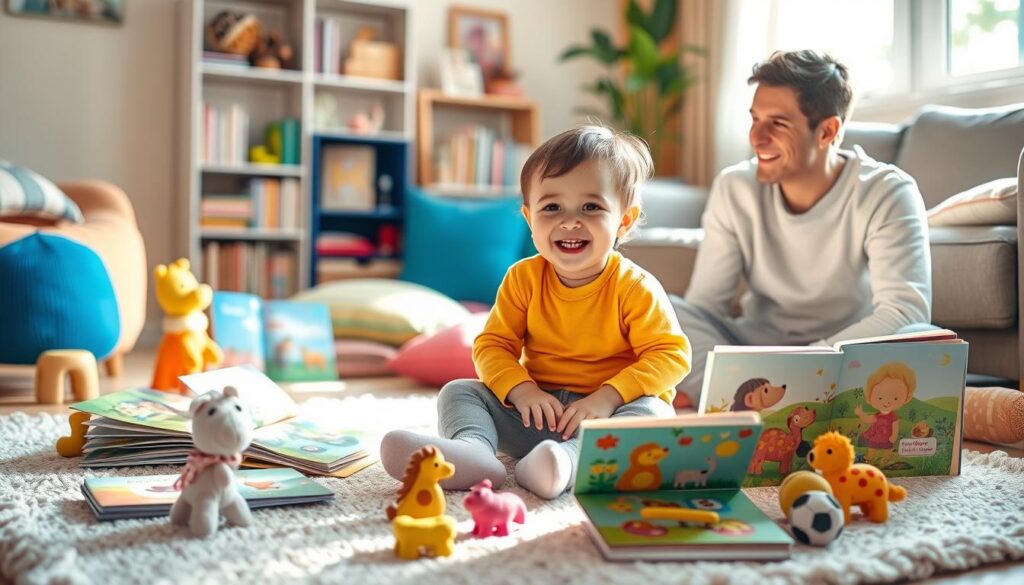
“Language development is a process that requires patience, consistency, and positive reinforcement. By providing a supportive and engaging environment, you can help your toddler develop the language skills they need to succeed.”
Play-Based Activities That Promote Speech Development
Playing with your toddler is a great way to help them talk better. These fun activities also teach them important language skills. By doing these activities every day, you help your child start learning language well.
Interactive games, role-playing, and music and movement games are good for young children. They help your child learn new words, practice saying them right, and get better at talking.
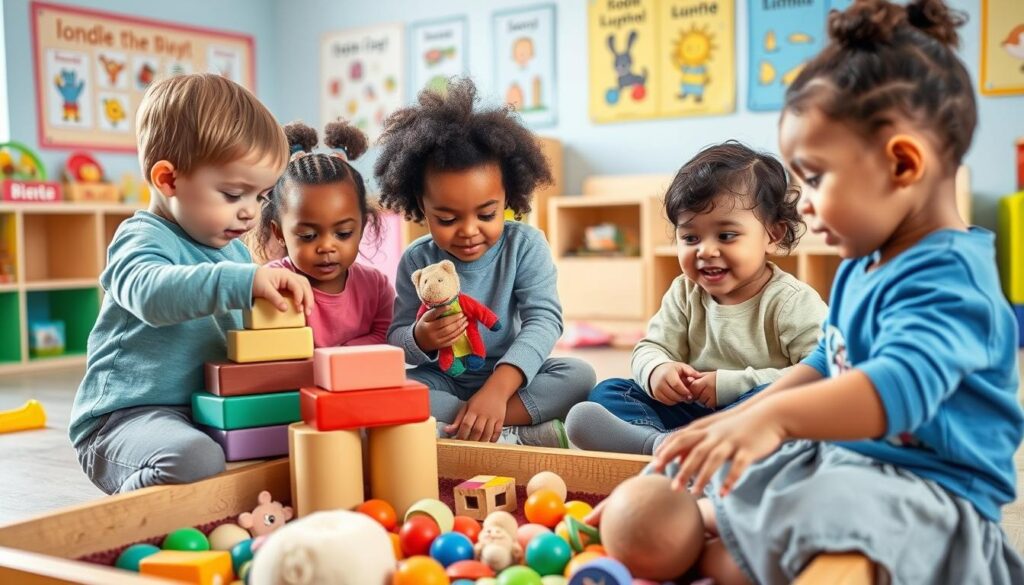
Interactive Games for Language Learning
Interactive games are great for teaching your toddler new things. Try “I Spy” or “Simon Says” to help them learn to follow directions and grow their vocabulary.
Role-Playing Activities
Role-playing helps your child learn social skills and practice talking. They can pretend to be different people and practice talking to others.
Music and Movement Games
Music and movement games are fun and help with rhythm and timing. Sing songs or recite nursery rhymes with your child. Encourage them to repeat the words.
Adding these play-based activities to your daily routine is good for your child’s language skills. Make sure they’re fun and give your child lots of chances to practice and learn.
Reading Together: A Powerful Tool for Vocabulary Growth
Reading together is a great way to help toddlers grow their language skills. It not only sparks a love for books but also boosts vocabulary and language abilities. By reading with your toddler, you create a space where they can dive into stories and learn new words.
Choose books with simple, colorful pictures and fun stories. Use words to point out objects and characters, asking your toddler to repeat them. This interactive method is a powerful way to improve their speech and language skills.
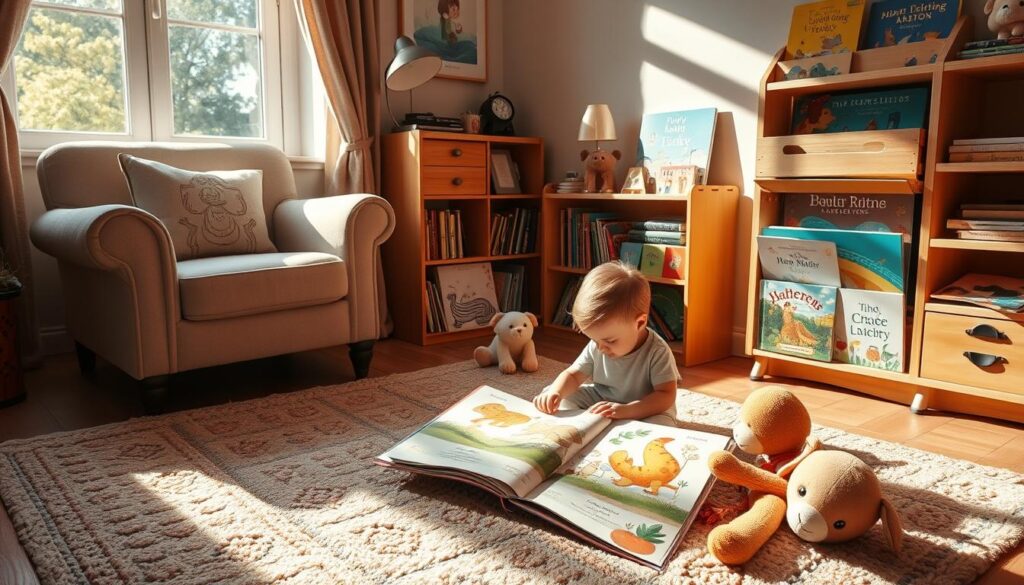
- Starting with simple books and gradually moving to more complex ones
- Asking open-ended questions to encourage conversation and participation
- Using different voices and tones to bring the story to life
By following these tips, reading can become a fun, interactive experience for your toddler. This helps them grow their language skills and sets them up for success in school and life.
Make sure reading is a fun and engaging activity for your toddler. This way, they’ll develop a strong language foundation, preparing them for future challenges.
Using Technology Wisely to Support Speech Development
As a parent, you know how technology affects your child’s life. It can be a great tool for speech development. By using the right strategies, you can help your child improve their language skills. Technology is a big help in teaching young children to speak.
Age-Appropriate Apps and Programs
Many apps and programs can aid in speech development for toddlers. You can find language apps, interactive games, and educational programs. When picking one, think about your child’s age and needs. Look for apps that focus on speech and are simple to use.
Here are some tips for using technology to support speech development:
- Choose apps that are interactive and engaging
- Set limits on screen time to ensure a balance with other activities
- Use technology to encourage communication, such as video calls with family and friends
Setting Healthy Screen Time Limits
Technology is good for speech development, but it’s key to limit screen time. Too much screen time can harm language skills, social abilities, and health. By setting limits and encouraging other activities, you help your child find a balance.
| Age | Recommended Screen Time |
|---|---|
| 18-24 months | Some high-quality educational content, with parental guidance |
| 2-5 years | Limit screen time to 1 hour per day of high-quality educational content, with parental guidance |
Common Challenges and How to Address Them
Supporting your toddler’s speech can face challenges like speech delays. It’s key to spot these delays and know when to get help. Encouraging your toddler to talk is a great way to tackle these issues.
Signs of speech delays include not babbling by 6 months, not saying a few words by 12 months, or not combining two words by 24 months. If you see these signs, talk to a speech therapist. They can check your toddler’s speech and help improve their language skills.
Dealing with Speech Delays
Here are some ways to handle speech delays:
- Read books with simple, colorful pictures to get your toddler to point and name things
- Sing songs and recite nursery rhymes to help with sound awareness
- Talk to your toddler, even if they’re not speaking, to show them how language works and encourage them to respond
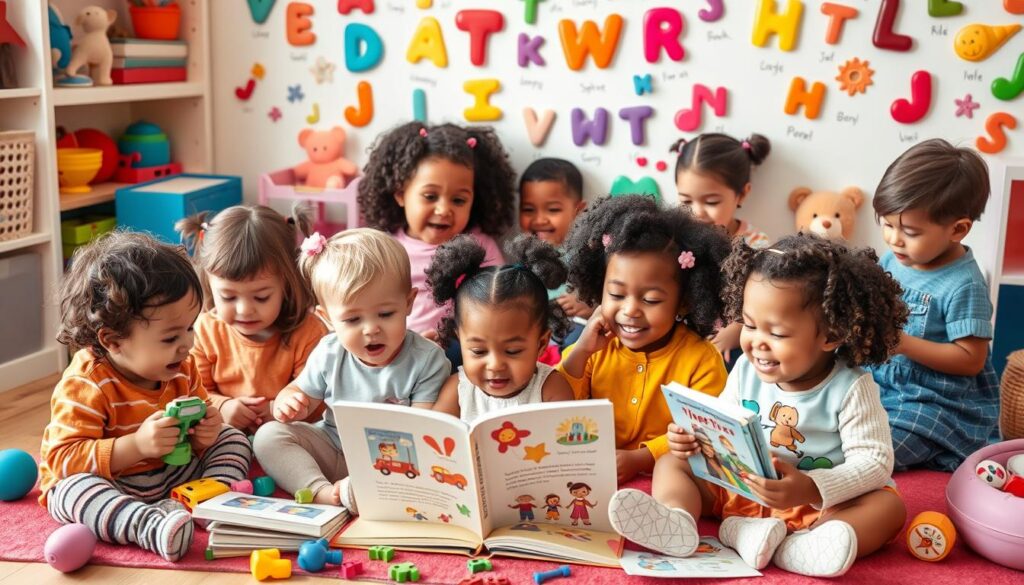
When to Seek Professional Help
If you worry about your toddler’s speech, see a speech therapist. They can check your toddler’s language and give you tips to help their speech grow.
| Age | Speech Development Milestone |
|---|---|
| 6 months | Babbling with vowel sounds |
| 12 months | Saying a few words, such as “mama” or “dada” |
| 24 months | Putting two words together, such as “mama go” |
Incorporating Speech Practice into Social Activities
Supporting your toddler’s speech development is key. You can do this by talking during playdates, outings, and social events. This helps them build conversation skills and grow their vocabulary. Fun activities like role-playing and games make learning a joy.
Creating chances for your child to talk is vital. Ask open-ended questions and listen well to their answers. For example, at a playdate, ask about their favorite toy. This boosts their confidence in talking to others.
Here are some ways to add speech practice to social activities:
- Host playdates to encourage talking and socializing.
- Play interactive games like “I Spy” to help with language.
- Describe what you see and hear on outings to boost vocabulary.
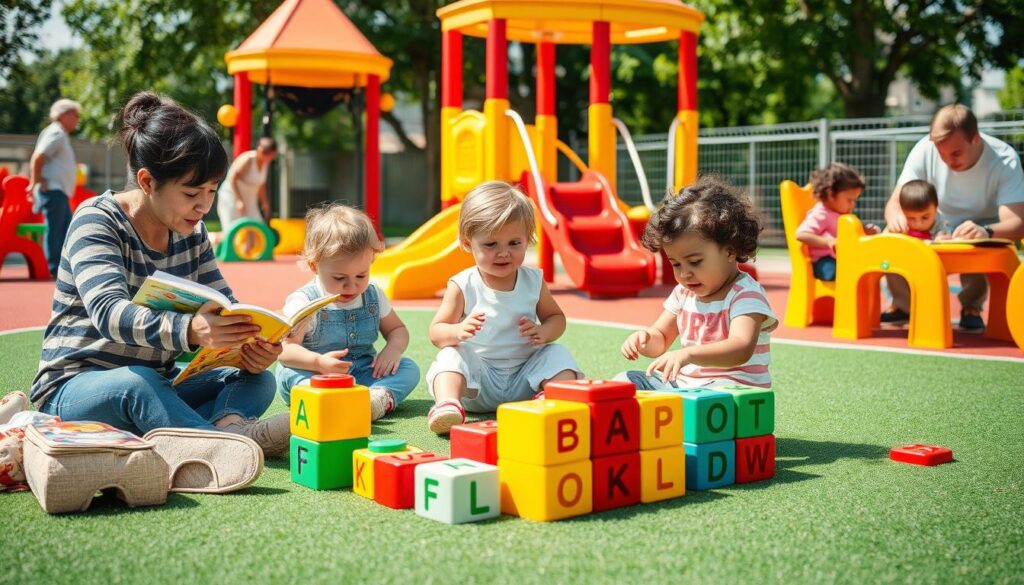
By mixing speech practice into social activities, your toddler will learn to communicate better. Make sure to be supportive and patient. With regular practice, they’ll develop strong speech and language skills.
| Activity | Benefits for Speech Development |
|---|---|
| Playdates | Encourages social interaction, conversation, and vocabulary growth |
| Interactive Games | Promotes language development, listening skills, and attention span |
| Outings | Exposes children to new experiences, sights, and sounds, promoting descriptive language and vocabulary growth |
The Role of Positive Reinforcement in Language Development
As a parent, you are key in helping your toddler learn to talk. Positive reinforcement is a great way to help them grow in language skills. It also boosts their confidence. By praising them well, you encourage them to speak up and build a strong language base.
Effective Praise Techniques
When you praise your toddler, be clear and sincere. Say something like, “I like how you asked for that toy with your words.” This shows them what they did right and makes them want to do it again. You can also teach new words by labeling things and actions.
Building Confidence Through Communication
It’s important to make your child feel good about talking. Create a supportive space for them to feel confident in speaking. This will make them more likely to try out new words and talk to others. Always respond to their attempts to communicate, even if they’re not perfect. Positive feedback will keep them eager to speak more.
Working with Caregivers and Teachers
As a parent, you’re key in helping your toddler talk. But you’re not alone. Caregivers and teachers can also help a lot. It’s important to work together to help your child talk better.
Start by telling caregivers and teachers about your child’s language goals. This way, they can help your child talk more. They will know how to support your child’s language skills.
Here are some ways to help your toddler talk better with caregivers and teachers:
- Make a daily routine that includes activities that help with language.
- Ask caregivers and teachers to talk to your toddler all day.
- Give your toddler chances to practice talking in different places.
Working together with caregivers and teachers can make a big difference. It helps your child learn to talk better. Make sure to talk often with your child’s caregivers and teachers. This way, everyone knows what to do to help your child.
By working together, you can help your toddler learn to talk well. Follow these tips and team up with caregivers and teachers. This way, your child will get the help they need to talk and communicate better.
| Setting | Language-Rich Activities |
|---|---|
| Home | Reading, singing, and conversations during daily routines |
| Childcare | Group conversations, storytelling, and interactive games |
| Outdoor play | Describing nature, pointing out objects, and encouraging vocabulary building |
Conclusion: Supporting Your Toddler’s Speech Journey
Starting your toddler’s speech journey is exciting and rewarding. Remember, every child grows at their own pace. By using the strategies from this article, you can help your toddler grow their language skills.
Be patient and consistent in supporting your toddler’s communication. Celebrate every small achievement. Give them lots of chances to practice and learn about language. With your help, your toddler will become more confident and skilled in speaking.
You are your toddler’s most important helper. By focusing on their speech, you’re building a strong foundation for their future. Enjoy this time and watch as your toddler finds their voice.
